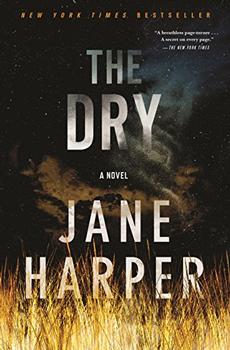Book Club Discussion Questions
In a book club? Subscribe to our Book Club Newsletter!
For supplemental discussion material see our Beyond the Book article, The Big Dry - Rivers and Drought in Australia and our BookBrowse Review of The Dry.
Please be aware that this discussion guide will contain spoilers!
Welcome to the Reading Group Guide for
The Dry. Please note: In order to provide reading groups with the most informed and thought-provoking questions possible, it is necessary to reveal important aspects of the plot of this novel - as well as the ending. If you have not finished reading
The Dry, we respectfully suggest that you may want to wait before reviewing this guide.
1. The drought overshadows everything that happens in The Dry. In some ways it could almost be said to be a character in its own right. What is it about the drought and its effects on the town that make people less likely to question what happened to the Hadlers?
2. How does the drought color our impressions of Kiewarra, its residents, and the Australian bush throughout the novel?
3. Secrets and lies and the reasons why people keep them are the core of this novel. Luke and Gretchen both keep the secret about their whereabouts on the day Ellie died, even from Falk, but for different reasons. How does the keeping of this secret affect their relationship with each other and with Falk? How does it impact the way the truth comes out about Ellie's death?
4. Why do you think Gretchen is so reluctant to tell Falk who Lachie's real father is? Who do you think it is?
5. Jamie Sullivan's secret needlessly hinders the investigation into the Hadlers' deaths, and yet his fears about what people in a small town might do if they found out about his—and Dr. Leigh's—homosexuality are understandable. Similarly, Ellie Deacon keeps the secret of her father's abuse, with tragic consequences. What does this tell us about the nature of secrets, and the need for truth? Is it better for some secrets to be kept?
6. "Falk felt a sharp pang of longing for what might have been" (p. 112). How has growing up without a mother affected Falk's life? In what ways does this become especially apparent when he and his father move to Melbourne and cut all ties with his childhood home?
7. "Why couldn't he let her in? Why wouldn't he let her in? Did he not trust her? Or did he not love her enough?" (p. 140). Falk's adult relationships have not been what he hoped. How have the events surrounding Ellie's death and his relationship with Ellie in life affected Falk and his ability to engage with people?
8. Do you think that leaving town was the right way for Erik Falk to deal with the situation he and Aaron were facing? How did his father's doubts about him affect Aaron?
9. "I know Luke was your mate and Dow's a dickhead, but in a lot of ways they were quite similar. Both larger than life, got tempers on them, always had to be right. Two sides of the same coin, you know?" (p. 136). Luke is revealed to us as someone who had both good and not so good qualities. In spite of their long friendship, Falk cannot quite rule out that Luke might have committed the murders of his wife and son. In what ways did Luke differ from Grant Dow? What was it about Luke that made people think him capable of murder?
10. "As they shook hands for what would prove to be the last time, Falk found himself struggling to remember, once again, why they were still friends." (p. 185). In spite of their shared childhood, Luke and Falk had very different personalities. What is it that spells the end of their friendship? Do you think they would have remained friends if they hadn't lied about where they were at the time of Ellie's death, and/or if Luke had told Aaron where he really was in the first place?
11. The fictional town of Kiewarra is the central setting of the novel. How does the town itself inform our ideas about the people who live there and the events that take place there? What are the positives and negatives of a small town's tight-knit community?
12. The bush, the rock tree, and the Kiewarra River are the scenes of several major events in the novel. Why do you think Aaron is drawn to these places? What does the contrast between the wild places in the novel and those tamed by human habitation show us?
13. Jane Harper has chosen to tell this story in the past tense and third person, from Aaron Falk's point of view, and with flashbacks from various characters threaded throughout. What is the effect of this? How does it shape the reader's understanding of Aaron himself, as well as of the other characters in the novel?
14. Some of the flashback scenes are shown to the reader a second time in a more expanded form as the novel progresses. What does this device show us about the reliability of the assumptions we make about the events and the characters?
15. The novel begins with a prologue that describes flies being drawn to the scene of the murders. Why is this approach such a powerful way to introduce the events of the novel?
Unless otherwise stated, this discussion guide is reprinted with the permission of Flatiron Books.
Any page references refer to a USA edition of the book, usually the trade paperback version, and may vary in other editions.
